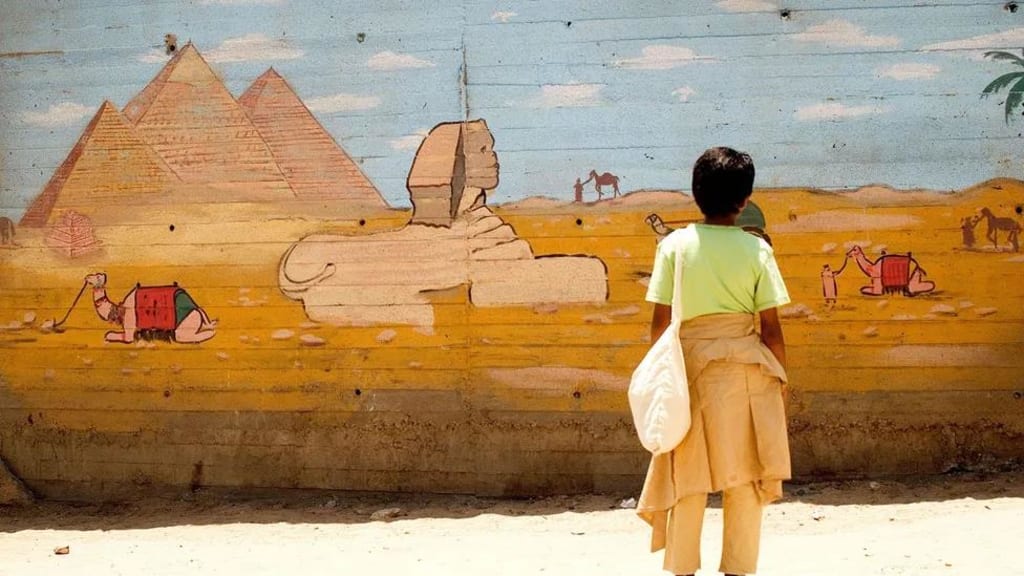
It is the story of a reversal of fortune: a camel rider previously recruited by the associates of Egyptian president Hosni Mubarak to attack protesters at the peak of Egypt’s 2011 mass protests finds his own revolutionary spirit in an October protest of the same year. He does so in a peaceful demonstration – staged by a group of Coptic Christians – against the demolition of a church in the southern part of the country. However the situation spirals out of control; violence erupts, and the rider gets shot by an invisible attacker.
The film is After the Battle (2012), Yousry Nasrallah’s Cannes-nominated dramatisation of the intense commotion that followed the ousting of Mubarak in February 2011. The event it references is the Maspero Massacre, one of the most heinous chapters of the revolution in which at least 26 defenceless protesters, mostly Copts, were killed by the army and the security forces in. These days, it is a taboo subject in Egypt, forbidden from being discussed in any media or artform. So, eight years on from its release, After the Battle now feels like an artefact from a bygone era – an emblem of the short-lived freedom Arab cineastes enjoyed in the wake of the democratic revolutions in the region; and of the great promise that was never fulfilled and has been dashed to the ground.
It was ten years ago today that the so-called Arab Spring protests had a watershed moment when Tunisia's autocratic president Zine El Abidine Ben Ali fled the country, becoming the first of a number of leaders in the region to be deposed. The effect of such earth-shaking events extended to cinema: to state that the Arab Spring has been the most pivotal occurrence in the modern history of Arab film would not be an overstatement. But just as the uprisings' political impact has been mixed in the long-term, so too has their cinematic legacy.
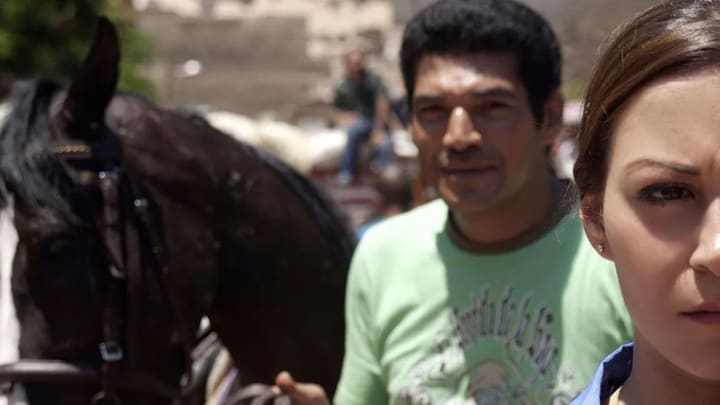
From the turn of the millennium onwards, Arab cinema had already been enjoying an artistic renaissance thanks both to new technology helping to reduce production costs, and the rise of the Gulf Film Festivals – Dubai, Abu Dhabi, and Doha – that presented the emerging filmmakers with a new well of money and co-production opportunities. The proliferation of state grants, especially in the Maghreb countries, also played a key role in giving birth to a new generation of Arab voices.
What remained, however, were limitations over what subjects could be explored. These varied from nation to nation – Tunisia, Morocco and Lebanon were more relaxed about sex, while Egypt, and to a lesser extent Syria, did allow some leeway in criticising state corruption. However the ruling elites remained untouchable in all Arab states, as any form of barbed political commentary, whether in the media or arts, was usually treated with hostility by the governing establishments.
The first wave of films
But the picture radically changed with the successive toppling of the region's old regimes over the course of 2011. A wave of high-spirited, hastily-made fiction and non-fiction films were made to capitalise on the popularity of the revolutions. Examples in Egypt are numerous: that year saw the release of the documentary anthologies 18 Days and The Good, the Bad and the Politician, as well as Tahrir: Liberation Square, 1/2 Revolution and Born on the 25th of January; then, in 2012, came Winter of Discontent, Waves, A Deep Long Breath and Reporting... A Revolution.
Tunisian filmmakers were similarly inspired, leading to a slew of revolution-centred films in 2011 and 2012 such as No More Fear, Cursed Be the Phosphate, It Was Better Tomorrow. Die Welt (The World), Dégage (Get Out!) and Rouge Parole (The Red Word), to name a few. "[They] found a new-found sense of purpose and large amount of freedom they never had before the revolution," celebrated Tunisian producer Dora Bouchoucha tells BBC Culture. "They felt more at ease in getting closer to their subjects. Their films were political, but they originated mostly from a personal place."
It wasn't our aim to evaluate what was going on at the time; we were simply reacting to those unfolding events – Ahmad Abdalla
All these films largely shared the same narrative: the oppression of citizens and abuse of power by authorities forces the people to peacefully revolt and they ultimately succeed in toppling their regimes. The works also spoke to a new freedom of expression – although a special reverence was upheld for the military which was overseeing the transitional period in both Egypt and Tunisia.
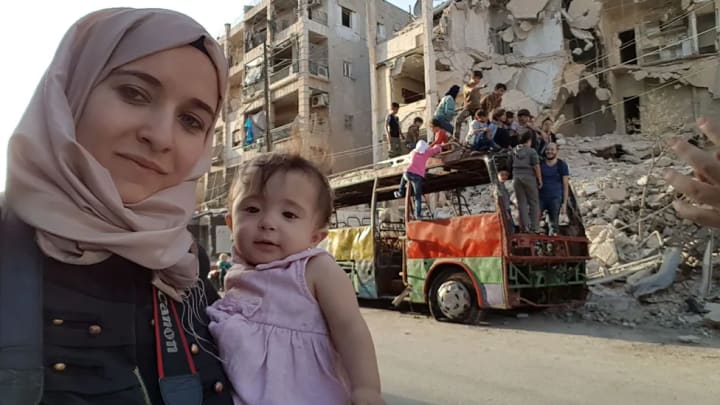
But while filmmakers found they could communicate with an openness they'd never experienced before, they failed to channel this freedom into works that looked beyond the ephemeral revolutionary moment. A sense of jubilation and triumph marked the conclusions of most of these films, which possess a kind of finality that proved to be short-sighted. "It wasn't our aim to evaluate what was going on at the time; we were simply reacting to those unfolding events," Ahmad Abdalla, one of the directors who contributed to 18 Days, tells BBC Culture. "Cinema was just another artform out of many that found itself driven to engage with the reality of the time [using] different means. Looking at these films now, I think they have a great documentation value, especially now that works about 2011 are [no longer] allowed to be made [in Egypt]."
Meanwhile the magnitude of the Arab Spring was too immense for the world's biggest film festivals and foreign markets to resist. Film festivals the world over sought to jump on the revolution bandwagon. 18 Days, No More Fear and After the Battle were in Cannes; The Good, the Bad and the Politician and Winter of Discontent were selected by Venice; Tahrir: Liberation Square was scooped up by Locarno. Arab films were suddenly everywhere, and after struggling for decades to gain the attention of the West, the West finally came calling.
Looking beyond Egypt and Tunisia, the cinema of other countries both directly and indirectly affected by the Arab Spring ventured to react to the uprisings. The tone of these works varied from cautious optimism to detached scepticism about the possibility of change. In Yemen, a slew of documentaries was released to bring attention to a revolution that appeared to be doomed from the start: these included The Reluctant Revolutionary (2012), The Mulberry House (2013), and The Rise of the Houthis (2015). In Morocco, a handful of pictures – My Makhzen and Me (2012); They Are the Dogs (2013) – alluded to the sweeping force of the Arab Spring that, nonetheless, never managed to land a blow in Morocco itself. In Algeria, Normal! (2011) by veteran filmmaker Merzak Allouache was the only movie that tackled the insurgency, which had a weak influence and didn't crystalise into a full-blown movement until 2019.
Syrian films were primarily focused on the devastating impact of the war on the civilians, while seldom touching upon the complexities of the political situation at hand
In Syria, peaceful protests were met with state violence, leading to the involvement of violent groups in return, and a civil war. The narratives of Syrian films were, like those from Yemen, devoid of the optimism that informed the Egyptian and Tunisian films of 2011 and 2012.
All of them were primarily focused on the devastating impact of the war on the civilians, while seldom, if ever, touching upon the complexities of the political situation at hand and the deep-rooted divisions inside Syrian society that transformed what was initially a revolution into a fully-fledged civil war. The influx of refugees into Europe gave Syrian cinema an international exposure it had never enjoyed before. From Return to Homs (2013) and A Syrian Love Story (2015) to Last Men in Aleppo (2017) and 2019’s For Sama, the post-2011 Syrian cinema has become a fixture in the global film and TV ecosystem.
A darkening mood
In most Arab countries, however, even those where leaders were deposed, the mood soon darkened, as the Arab Spring failed in delivering on its promises. The rise of political Islam in Egypt and Tunisia and the advent of Isis in Libya and Syria hindered the transition to democracy, while in Libya and Egypt, the subsequent reassembling of previous ruling regimes and the expansion of military powers hammered the final nail in the coffin of the revolution.
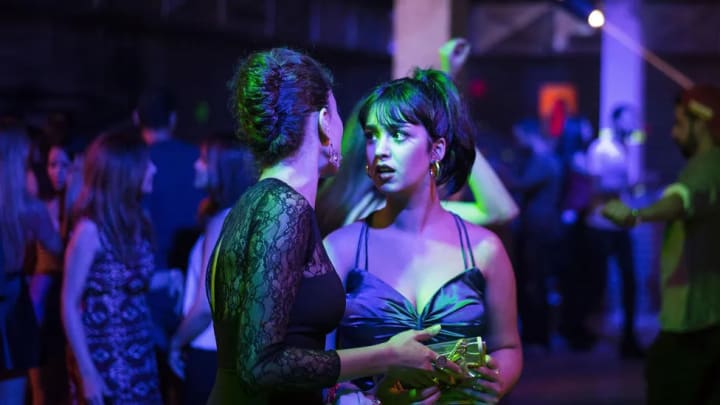
This tragic atmosphere translated to the films being produced. In Egyptian Ahmad Abdalla's almost wordless, sombre Rags and Tatters (2013), an ex-convict is discharged from prison in January 2011 to find himself thrust into a lawless, godless pandemonium charged with fear and doubt. In Tunisian Kaouther Ben Hania's Beauty and the Dogs (2017), a rape victim finds herself battling a still-crooked patriarchal system.
Nevertheless, while political tumult has remained widespread, the degree to which cinema has been allowed to prosper has varied from country to country. The paths of Egypt and Tunisia notably diverged from 2014 onward. In the former, censorship has tightened to an extent unwitnessed since the heyday of the Gamal Abdel-Nasser reign in the 1950s and 1960s. Various films about the recent unrest were effectively banned, including Tamer El Said's In the Last Days of the City (2016), a panorama of a collapsing, pre-revolution Cairo which contains a scene of a protest against the army; and Tarik Saleh's The Nile Hilton Incident (2017), a crime noir exploring police corruption in the waning days of Mubarak's Egypt.
Direct censorship has morphed into self-censorship as religion has replaced politics to become the biggest taboo subject in the country – Dora Bouchoucha
Meanwhile after the Egyptian government seized full control of the entertainment industry following a 2013 coup, a distrustful and anxious public became consumed by what Abdallah describes as "camera-phobia". "People have grown suspicious and resentful of cameras, especially in comparison to 2011 and 2012 when everyone felt compelled to document what was happening around them," he says. "It also tells a lot about the general state of mind of the nation."
However the story in Tunisia has been different. Despite the rise of terrorism in the country, alongside continuous crippling bureaucracy and economic stagnation, Tunisian artists have succeeded in preserving some freedom, bolstered by an increase in state funding.
That's not to say its cinema has been entirely free of censorship. "Direct censorship has morphed into self-censorship as religion [has] replaced politics to become the biggest taboo subject in the country," says Bouchoucha, citing the example of Nadia El Fani's Neither Allah, Nor Master! (2011), a provocative documentary about what the self-proclaimed atheist director viewed as the enforced religiosity of the country. In its year of release in Tunisia, a group of Salafists attacked the screening of the film at Africa Movie Theatre in Tunis Downtown. "Artists no longer fear censorship from the government; what they now fear is the public who take it upon themselves to attack anything they find sacred to them," she continues.
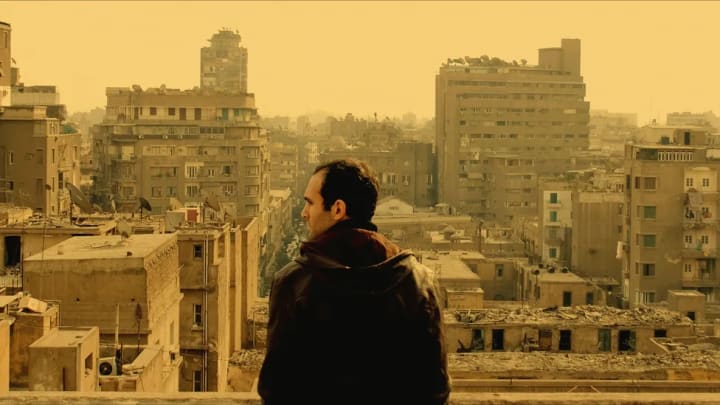
But nevertheless Tunisian moviemakers have managed to develop their industry by introducing new genres, technologies and ideas. Two prime examples of the invention and innovation occurring in the country's cinema are Abdelhamid Bouchnak's Dachra (2018) and Ala Eddine Slim's Tlamess (2019). Dachra is the country's first horror film and has ushered in a forthcoming wave of genre filmmaking in the country, with its employment of horror tropes to criticise the dominance of religion showing off a new means of expression for filmmakers to get around censorship. Meanwhile, using a highly distinctive form of surrealism, Tlamess touches upon militarism, ascribed gender roles and existential ennui while giving Arab cinema its very first scene of full-frontal nudity.
Elsewhere, in Yemen, Libya and Syria, the key filmmaking focus has been on depicting the deteriorating conditions in these countries, as traced in various documentaries by filmmakers now living in exile such as London-based Libyan director Naziha Arebi's Freedom Fields (2018); Copenhagen-residing Syrian director Feras Fayyad's The Cave (2019); fellow Syrian Waad Al-Kateab's co-directed For Sama, documenting her way out of her war-torn homeland; and Los-Angeles-based Sufian Abulohom's Yemen: The Silent War (2018).
The future of Arab cinema
A decade later, the revolutionary energy of the Arab Spring is still in evidence, in life and on the big screen. The popular uprisings in Algeria and Lebanon in 2019 and 2020 have spawned pictures that adopt narratives similar to those of the early Arab Spring films – from Karim Aïnouz's colourful portrait of the Algerian revolutionary youth, Nardjes A. (2020), to several Lebanese projects in the pipeline that now could be scrapped after the explosion in Beirut last summer dented hopes of a happy ending for protestors.
In Sudan, meanwhile, a revolution occurred nine years after the first wave of the Arab Spring began that has also led to the rise of cinema in the country. However as Sudanese filmmakers reflect on events, it is clear from their films that they have learned the precious lesson that revolutions could fail at any moment and that the road to democracy is long and arduous. Two documentaries from 2019 capture the essence of a country on the cusp of change yet cast doubt over the tangible possibility of extensive institutional overhaul. In Suhaib Gasmelbari's Talking About Trees, a group of veteran filmmakers attempt to resurrect an old cinema outside Khartoum only to be confronted by stifling red tape that is not expected to dissolve in the near future. The same repressive rules are faced by a group of female athletes striving to assemble the country's first women football squad in Marwa Zein's Khartoum Offside, which stresses that the country's overriding patriarchy will continue to challenge the reformist efforts.
As for the original uprisings? The legacy and aftermath of the Arab Spring continues to haunt the region's cinema, and yet a complete account of what happened in 2010 and the years afterwards is yet to be told. The most popular hits about the uprisings – Jehane Noujaim’s The Square (2013) from Egypt; the aforementioned Beauty and the Dogs from Tunisia; the countless Syrian documentaries – offer straightforward, digestible narratives catering to a largely Western audience unaware of the nuances and complexities of the region and its history. And since nearly all independent Arab films rely on European capital for finance, productions are usually shaped by what the west expects the Arab world to be, and are ultimately evaluated by western critics with little to no knowledge of the region.
The rise of Sudanese cinema and the remarkable evolution of Tunisian films will ensure that the spirit of the Arab Spring remains alight on the big-screen. The real story of the rise and fall of the Arab uprisings, on the other hand, is still waiting to be told.
About the Creator
Mejra
Later, respectively, wander and suffer sorrow.




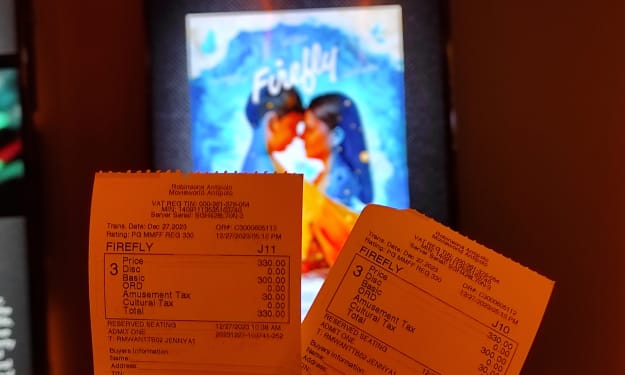

Comments
There are no comments for this story
Be the first to respond and start the conversation.